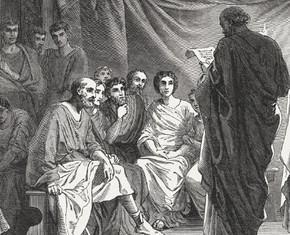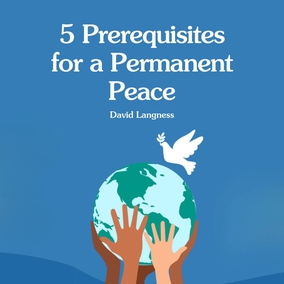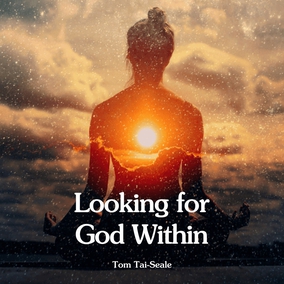The views expressed in our content reflect individual perspectives and do not represent the authoritative views of the Baha'i Faith.
How many paths are there to God? There are as many paths to God as there are souls on the Earth. – Rumi
Most people would probably agree that we all forge our own paths to God, as Rumi suggested. Also, most would likely agree that many different religious paths have at least some validity.
But not everyone. Some people definitely disagree, saying that their religion or their particular path is the one and only way to achieve salvation or spirituality or any true enlightenment; and that all other paths to God are false.
Which one of those approaches do you believe in?
If you favor Rumi’s approach, you’re what’s now called a religious pluralist. You may not have ever heard the term or thought about yourself this way, but take a look at these definitions of pluralism to see if they resonate with what you already think and believe:
pluˊralˑism: n. various ethnic, religious, etc. groups existing together in a nation or society
reˑliˊgious pluˊralˑism: n. an approach to faith usually characterized by humility regarding the level of truth and effectiveness of one’s own religion, as well as the goals of respectful dialogue and mutual understanding with other traditions
Lately, philosophers and theologians increasingly group people of faith into three distinct categories of belief: pluralist; exclusivist; and inclusivist.
The British author, Anglican rector and theologian Alan Race first came up with this three-stage concept in 1983. A well-known advocate of interfaith understanding and activities, he wrote:
Religious studies is healing us of our stereotyped views about other religions; the ethical principle of respect in relationships with our neighbours is demanding that we learn from other religions; dialogue opens the door to further ‘critical communion’ with other religions …
So, before we explore this new idea, let’s define what the two other approaches to faith actually mean:
exclusivist: n. a religious person who believes that only one set of beliefs or practices can ultimately be true or correct, and all others are in error
inclusivist: n. a religious person who believes that one set of beliefs is absolutely true, but that others are at least partially true
To sum up:
- If you believe your religion is the absolute truth and all others are false, you’re an exclusivist.
- If you believe your religion is the truest, but others also have some truth, you’re an inclusivist.
- If you believe your religion is true but not the exclusive source of truth, and that multiple religious beliefs can and should co-exist in the world, you’re a pluralist.
Which one are you?
Baha’is are pluralists—in fact, Baha’is go beyond religious pluralism. The Baha’i teachings transcend tolerance and pluralism and advocate religious oneness:
The fundamental principle enunciated by Baha’u’llah, the followers of His Faith firmly believe, is that religious truth is not absolute but relative, that Divine Revelation is a continuous and progressive process, that all the great religions of the world are divine in origin, that their basic principles are in complete harmony, that their aims and purposes are one and the same, that their teachings are but facets of one truth, that their functions are complementary, that they differ only in the nonessential aspects of their doctrines, and that their missions represent successive stages in the spiritual evolution of human society. – Shoghi Effendi, The Baha’i Faith – The World Religion, A Summary of Its Aims, Teachings and History, presented to the United Nations, 1947.
Baha’is don’t just think about religion in a pluralist way—they think about religion as a single entity, as a continuous stream of revelation, as “facets of one truth:”
The divine religions must be the cause of oneness among men, and the means of unity and love; they must promulgate universal peace, free man from every prejudice, bestow joy and gladness, exercise kindness to all men and do away with every difference and distinction. – Abdu’l-Baha, Selections from the Writings of Abdu’l-Baha, p. 28.
But how can the various religions, often at odds with each other, ever become “the cause of oneness among men,” and “do away with every difference and distinction?”
In this series of essays on religious pluralism, we’ll look at the way the Baha’i teachings propose to solve this ages-old human dilemma.
You May Also Like
Comments

















I would only point out that "inclusivists" usually also believe that "multiple religious beliefs can and should coexist in the world." This tolerant and generous view is not "exclusive" to pluralists. I would describe myself as an inclusivist Christian in that mold. It has been my observation that most Baha'is fall into a similar inclusivist category. There is no question that Baha'is believe their religion is "the truest" for the present time in history, while also recognizing truth in other religions and understanding that each of us is accountable only for the spiritual light ...that has come to us.
I would have to agree with Bill Carsley. As a Bahai my understanding of the Bahai teachings is that all true religions (and yes, there are false religions originating from man) are tailored for their time period and cultural history and that the Baha'i Faith is the fulfillment of the prophecies of earlier religions.
Consider this, a spiritual believer who investigates the Bahai Teachings and turns away due to their strong attachment to an earlier dispensation is in error. While it is not a Bahai's duty to judge that person, it is our duty to seek to guide ...them as long as they are seeking such guidance. Why? Because as Bahai's we are certain that our path, the Bahai' path, is the truest for this dispensation.